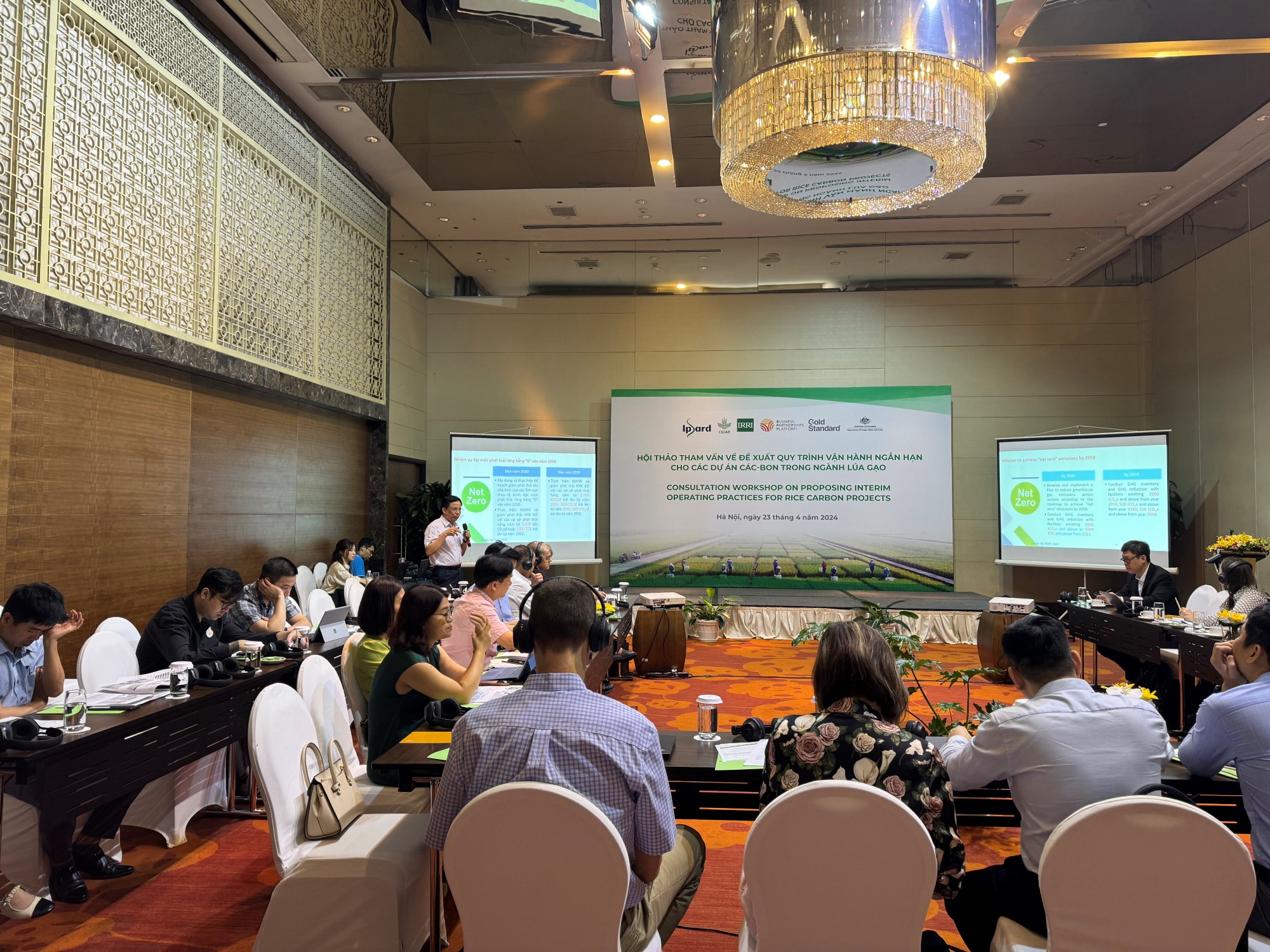Interim carbon project procedures for rice sector recommended at workshop hosted by IPSARD and IRRI

Hanoi, Vietnam (23 April 2024) - The Institute of Policy and Strategy for Agriculture and Rural Development (IPSARD), in cooperation with the International Rice Research Institute (IRRI), organized a consultation workshop to introduce and propose recommendations for an interim operating procedure for carbon projects in rice.
The workshop was well-attended with representatives from various agencies under the Ministry of Agriculture and Rural Development (MARD), Ministry of Natural Resources and Environment (MONRE), international organizations, private sector, and other relevant stakeholders. The aim of the workshop was to discuss the draft document of recommendations for interim operating procedures for rice carbon credit projects in the present and near-term during the time when legal and regulatory frameworks are being developed, but not yet in effect.
Opening the workshop, Dr. Nguyen Anh Phong, Deputy Director General of IPSARD, shared that the Government of Viet Namt, particularly MONRE in collaboration with the Ministry of Finance (MOF), is in the process of setting up a framework for the future carbon market. The current timeline expects to pilot the framework in 2026 and achieve full operational status by 2028. Dr. Phong explained that rice production is being prioritized for carbon credit pilot activities due to its significant potential for reducing greenhouse gas emissions. He highlighted the importance of preparing the agricultural sector for further engagement in domestic and international carbon exchanges, be they for compliance or voluntary markets.
The current timeline leaves only two years for Viet Nam to meet the ambitious Nationally Determined Contributions (NDCs) greenhouse gas emissions reductions targets agreed to under the Paris Agreement. The majority of the NDC commitments are dependent upon contributions from international funding sources, but regardless of the funding source, these activities require the appropriate legal and regulatory framework to see targets realized, including the operating procedure for any and all emissions trading. This immediate need for guidance on how to operate within Vietnam between now and the launch of the domestic carbon market is crucial for meeting the NDCs.
Since the launch of the 1 Million Hectares of low-emission and high-quality rice program by the Government of Viet Nam in December 2023, there is strong interest to engage in rice carbon projects. The perceived and actual risks associated with engaging when there is no legal and regulatory framework in place may discourage interested parties, be they from private sector or the international development community, and that could translate into missed opportunities for carbon financing and higher value credits. The consultation workshop aimed to facilitate guidance during this uncertain period. Furthermore, any recommendations taken up, tested and proven during this interim phase may also, ultimately, be incorporated into the domestic carbon market scheme. Insights from the consultation will also help inform the roadmap for the carbon market regulatory framework development.
IRRI’s Country Representative to Vietnam, Dr. Robert Caudwell, focused his welcome message on the two previous workshops IRRI and IPSARD hosted last year. The series of workshops were helping to identify the next steps for various market actors and helping the agricultural sector prepare for the pilot and operational phases of carbon credit market development. Dr. Caudwell stressed that, building on the outcomes of the previous workshops, this consultation workshop aims to shed light on the need for operational procedures for rice carbon projects with a focus on sharing insights and recommendations from experts and stakeholders. He also highlighted that this effort aims to assist the government in developing its road map for the carbon market and addressing legal and regulatory challenges, especially in aligning the Sustainable development project for One Million Hectares of specialized, low-emission high-quality rice farming with Article 6 of the Paris Agreement.
After brief scene-setting presentations, the bulk of the workshop was a facilitated discussion. Participants raised questions, provided input to and recommendations for interim operating procedures for rice carbon projects, and provided insights from on-the-ground experience. Feedback on the draft procedures highlighted the need for clear guidance on each activity to be included in the roadmap and how the various actors can and will engage in the carbon credit markets in Viet Nam.
The need for capacity building and information sharing among the various actors was highlighted, specifically the need for a mechanism to communicate to medium and small companies with updated information on carbon market regulations and processes to meet the standards for low-emission rice.
One critical point that was clarified in the discussion was how Corresponding Adjustments would be handled by the Government of Viet Nam. It was indicated that for any carbon credit to be utilized outside of Viet Nam (and therefore requiring an adjustment to the NDC of Viet Nam), there would have to be explicit agreement through a bilateral agreement with the target country.
IPSARD and IRRI have committed to summarizing the results of the workshop, updating the draft, and preparing a set of recommendations for interested value chain actors and policymakers.
This is a joint activity between the International Rice Research Institute, the Gold Standard, and the Australian Department of Foreign Affairs and Trade through the Business Partnerships Platform with support from IPSARD, and the CGIAR Initiatives on Asian Mega-Deltas and Low Emission Food Systems.


